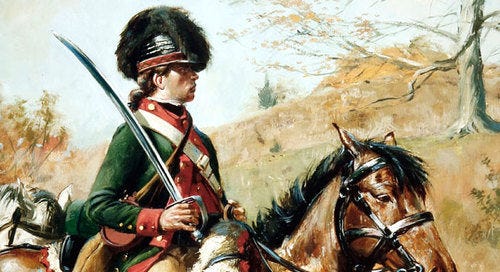A Son of the Revolution
At some point in 1777, somewhere near Monocacy, Maryland, a 19-year-old tailor’s apprentice, freshly arrived from Derry, Ireland, mustered in with Moylan’s Regiment of the 4th Continental Light Dragoons. His name was James Larkins, and he was my sixth-great grandfather.
Grandpa James (as I’ll call him, because Sixth-Great Grandpa James just doesn’t roll off the tongue that easily) went on to participate in the battles of Brandywine, Monmouth Courthouse, and Germantown. He suffered through the winter at Valley Forge. He fought at Yorktown. Shortly after, somewhere in South Carolina and shortly before the War of American Independence ended, he took a British musket ball to the leg and was lucky to survive. His war was over, but he had more than done his duty.
He lived out the rest of his life in the trade he had apprenticed for, applying for the government pension afforded veterans of the Revolution only when his eyesight failed in his old age and he could no longer thread a needle.
He was clearly a frontiersman by nature, as he and his growing family migrated ever westward while the new nation expanded its borders. He died in Ohio in 1828.
None of this part of my heritage was known to me prior to about 10 years ago, when I started doing my own genealogical research. I have no family stories about Grandpa James, sadly. I would’ve loved to know more about his experience in the war, and as an active participant in my country’s founding and its early years.
But there may be a very good reason he didn’t like to talk about the war in particular, or of his circumstances in coming here. It could very well be that Grandpa James was what you might call an illegal immigrant.
See, apprenticeships back then lasted until you were 21 years old. Notice how James enlisted at 19. There’s some compelling research online (because apparently people get very obsessive about documenting the lives of every single Revolutionary War veteran) suggesting James might have been sent over from Ireland with a shipment of red uniform coats intended for the British Army. And, for whatever reason, he decided he wasn’t going back. And that he was going to supply the Light Dragoons with these redcoats instead.
Indeed, the 4th Continental Light Dragoons were somewhat infamous in the early years of the war for wearing uniform coats identical in cut and color to those of the British, such that it caused some confusion on the battlefield. They eventually switched to a rather fetching green, along with very stylish helmets, as depicted here by Don Troiani:
If these suppositions of stolen British uniform coats are true (and boy do I hope they are, because how awesome is that?), one could understand why Grandpa James would want to stay a bit tight-lipped about that period of his life, regardless of his feelings regarding the cause for which he risked his life.
And that’s the thing—I don’t know Grandpa James’s politics. (Political identity in the early Republic was a complicated thing anyway; see the Youtube videos linked below.) I don’t know who he voted for, or if he voted at all, in the 11 national elections he lived to see after the war.
But he clearly thought the American Experiment was a cause worth fighting for, worth freezing for, worth bleeding for. There were no doubt many points during that long struggle where it seemed like it was all over, that the cause of liberty would be smothered in its cradle. But he kept fighting.
Our nation has never been perfect. Far from it, indeed. The men Grandpa James risked his life for were their own type of landed gentry, and they brought with their words of liberty the cloying stench of elitism and hypocrisy. But that doesn’t diminish the fundamentals of their message, seemingly as revolutionary today as it was 248 years ago: that we are all born with natural rights to liberty, to life…to happiness.
I see a lot of sadness, a lot of anger, this 4th of July. These feelings are more than justified. But defeatism is not. All nations end, and all empires fall in time, but it remains to be seen whether it is our time or not.
"Well, Doctor, what have we got, a republic or a monarchy?"
“A republic—if you can keep it.”
###
If you’re not following Heather Cox Richardson, start doing so now:
This is my favorite YouTube channel for political analysis; smart, fact-based, uninterested in feeding the rage-click machine that has done so much damage to our public discourse: https://www.youtube.com/@BeauoftheFifthColumn
And if you want a fascinating glimpse into how presidential politics came to be during the first years of the United States, check out these videos:




